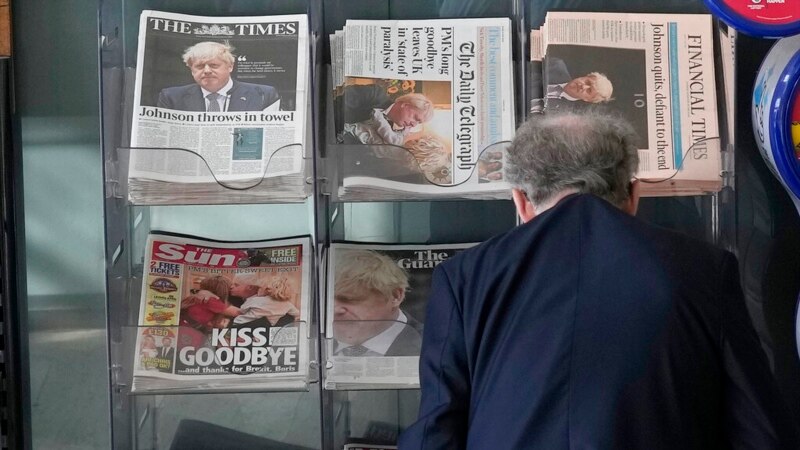
British Prime Minister Boris Johnson has been one of the West’s most ardent supporters of Ukraine in its war with Russia. So will his resignation, announced Thursday, prompt a change of policy from Britain?
Close bond
Johnson was among the first Western leaders to visit Kyiv following the Russian invasion, marching through the streets of the capital alongside Ukrainian President Volodymyr Zelenskyy just days after Russian troops had withdrawn from the outskirts of the city.
The two men forged a close bond, frequently posting public messages of admiration and support of each other on social media. In recent weeks, Zelenskyy was explicit in his desire for Johnson to remain in post.
In his relatively brief resignation speech Thursday, Johnson made special mention of Ukraine. “Let me say now to the people of Ukraine that I know that we in the UK will continue to back your fight for freedom for as long as it takes,” Johnson said.
Johnson spoke to Zelenskyy on the phone immediately after his resignation, reiterating Britain’s support. According to government officials he ended the conversation by telling the Ukrainian president, “You’re a hero, everybody loves you.”
‘Sadness’
Zelenskyy expressed “sadness” at the resignation.
“Britain’s role in protecting freedom is truly global,” he said in a video recorded Thursday evening. “And although it is a reflection of the position of British society, the leadership and charisma of the state’s leaders are always of particular importance. Especially during these times – the time of Russia’s full-scale anti-European war, which launched an attack on all Europe via our country. So, it is not surprising that Ukrainians feel personal gratitude to Boris.”
Many Ukrainians shared their president’s view of Johnson’s resignation.
“Britain will offer further support. But it will not be in the same way as with Boris Johnson. We can say he is a friend of our country,” Kyiv resident Dmytro Usikov told Agence France-Presse.
“I have personal sympathy for him,” said Vitaly Chervyakivsky, the owner of a fast-food restaurant in the capital. “He was helping Ukraine very much. He was one of the first who came here … he was not afraid that there was shelling here. A lot of respect for him. It is very sad that he resigned.”
Military aid
Britain is second only to the United States in the amount of military aid it has given Ukraine – including antitank rockets, missile systems, artillery, and, most recently, advanced multiple launch rocket systems or MLRS. Hundreds of Ukrainian troops are receiving training in Britain.
In total, Johnson pledged $2.8 billion of military support alongside $1.8 billion in humanitarian and economic aid.
Will his resignation spell a change in Britain’s level of support for Ukraine? Unlikely, said analyst John Kampfner, executive director of the U.K. in the World Initiative at Chatham House in London.
“Whoever will take over from Johnson will, I suggest, pretty much continue the policy as is. Not only because it has been, by the standards of this conflict, as successful as any country’s approach has been, but also domestically it’s popular too,” Kampfner told VOA.
No change
Britain Defense Secretary Ben Wallace, himself a possible contender to be the next prime minister, emphasized there was cross-party backing for the military support given to Ukraine.
“Britain is full square behind them. You know, the assistance to Ukraine we give is not just one person, not me, not the prime minister, it’s the whole effort,” Wallace told reporters Thursday.
Moscow welcomed Boris Johnson’s resignation. A foreign ministry spokesperson said the moral of the story was “do not seek to destroy Russia.”
AUKUS
Johnson sought to reposition Britain in other security arenas, emphasizing the importance of the AUKUS security pact with Australia and the United States in the Indo-Pacific.
“This shift more towards Asia and specifically the power and the threat posed by China, which was set out in the government’s ‘Integrated Review’ of just over a year ago, is an important thing. But Britain can only be a player alongside the other AUKUS countries – the United States in particular, Australia, and Japan; but also the European Union is increasingly an important player, as are countries like South Korea,” Kampfner said.
Some information for this report came from The Associated Press.
